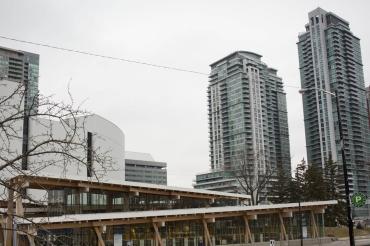Scarborough: A laboratory for new suburbanism

Published: September 27, 2016
What if the suburbs were actually the centre of a city? A collection of urban islands—complete communities for residents to work, dine, shop, gather with friends and family, and travel throughout with multiple transportation options.
U of T researchers, city planners, politicians and residents are looking to groups like the Institute for New Suburbanism to bridge the conversation of how we can better plan the space of our suburbs to meet the broad needs of its residents by creating comprehensive neighbourhoods within the larger city framework.
“These days, if you’re a millennial and want to buy a house in Toronto, you almost need to be a millionaire. So when millennials seek less expensive housing in suburban areas, they’re looking for typically urban uses—a coffee shop, live theatre and music, and locations to meet others and have interesting conversations,” says Dave Hardy, a registered professional planner and executive director of the Institute for New Suburbanism.
Hardy notes that millennials look to areas that provide convenience of movement and urban amenities. This shouldn’t seem too idyllic for Scarborough, which was built from a history of villages and already offers entry points for the Institute’s vision.
“We hope to grow the story of Scarborough by enhancing the quality of life of its residents through community planning, design and development,” says Morgen Peers, managing director for the Institute of New Suburbanism, at the Institute’s launch event on September 15 in Scarborough. He says we need to overcome the notion of ‘downtown’ as the only city centre, and instead, better plan suburbs to meet the broad needs of its residents.
As an anchor institution, U of T Scarborough has room to grow, as outlined in its Master Plan. Researchers from the University, including Professor André Sorensen, expert of urban planning and chair of the department of human geography at UTSC; and U of T Professor Paul Hess, an expert in pedestrian and transportation design, co-authored Choices for Scarborough: Transit, Walking and Intensification in Toronto’s Inner Suburbs last year.
Sorensen, a featured speaker at the Institute launch, says a change in thinking would be to start to design the suburbs to be less automobile dependent.
“This would be a major change and Toronto, especially Scarborough, is well positioned to be a world-leader in transforming its inner suburbs away from automobile dependence and towards places where residents have a genuine choice of travel modes and can enjoy living in complete communities.”
Sorensen stresses this isn’t an anti-car conversation, rather a discussion of livability and building infrastructure that is highly competitive with cars and able to connect with regional transit systems. Using Eglinton, Lawrence and Sheppard as examples, Sorensen says these are ideal potential corridors to create mid-rise, mixed-use space that would function like boulevards.
“These streets are wide—double the width of downtown streets like Bloor—they can accommodate dedicated transit lines, two car lanes in each direction, bicycle lanes and wide sidewalks—everything you need for a high-quality boulevard that’s a complete community in itself in a linear form,” he says.
Mayor John Tory and the City of Toronto are listening. Tory spoke to the importance of the Institute for New Suburbanism and says Scarborough stands out as a unique community with a distinct lifestyle, with its residents leading its transformation and development.
“In the face of increasing infrastructure challenges, it is critical that we study the suburbs and explore opportunities to further develop and grow these communities,” says Tory.
The Institute will engage Scarborough, the GTA and like-minded people around the world in four areas of conversation: Integrated community planning, research and dialogue, neighbourhood design, and, mobility and town centres.
The Institute will host its next event with Judith De Jong, a leading expert of design innovation in architecture and urbanism, on October 12.



